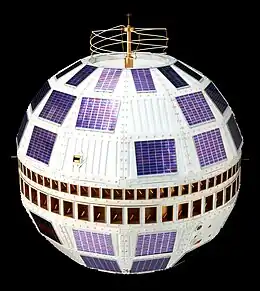Adidas Telstar
Telstar is a soccer ball made by Adidas. The iconic 32-panel alternating black-and-white design of the ball, based on the work of Eigil Nielsen, has since become a global standard design used to portray a soccer ball in different media.
 The 1974 World Cup Adidas Telstar | |
| Type | Soccer ball |
|---|---|
| Inventor | Eigil Nielsen |
| Inception | 1974 |
| Manufacturer | Adidas |
| Available | Yes |
| Current supplier | Adidas |
| Last production year | 2018 |
| Models made | Telstar Elast Telstar Telstar Durlast Telstar 18 |
Ball
The ball was first introduced as the "Telstar Elast" for the 1968 European Football Championship.[1] A slightly different ball named "Telstar" was used as the official match ball of the 1970 FIFA World Cup in Mexico.[2] The similar "Telstar Durlast" was one of two official balls, along with the Chile Durlast, of the 1974 FIFA World Cup held in West Germany.[2][3] The ball was also used in the 1972 and 1976 European Championships.
The Telstar was the first World Cup ball to use the now-familiar truncated icosahedron for its design, consisting of 12 black pentagonal and 20 white hexagonal panels.[2][3] The 32-panel configuration had been introduced in 1962 by Select Sport,[4][5] and was also used in the official logo for the 1970 World Cup.[6] The black-and-white pattern, to aid visibility on black and white television broadcasts (colour television was still rare worldwide during this time), was also well established before the Telstar.[5][7]

The name came from the 1962 Telstar communications satellite, which was roughly spherical and dotted with solar panels, somewhat similar in appearance to the football.[2] Developed by Bell Telephone Laboratories for AT&T, Telstar was the world's first active communications satellite[8] and was the first to send live television signals, telephone calls, and fax images through space,[9] which inaugurated an age of instant worldwide communications via satellite.[10]
The ball was made of leather.[2] The 1974 model's "Durlast" polyurethane coating provided waterproofing as well as protection from damage such as scuffs and tears.[11]
Only 20 Telstars were provided for the World Cup; an estimated 600,000 replicas were sold subsequently.[2] Some 1970 matches were played with a brown ball.[12] The Chile Durlast was all white and was used during the Italy-Germany semifinal for the first 20 minutes, then it was replaced by a 32 panel black and white due to a deflation.[3]
A new version of the Telstar, named Telstar 18, was the official match ball for the 2018 FIFA World Cup. The design maintains the general pattern, except the corners of the pentagons are stretched into pixellated gradients.
Telstar is now considered a classic design. Although most soccer balls used in current championships have different designs and sections, in representations of soccer balls in cartoons, comics, caricatures and decorations in general, soccer balls inspired by Adidas Telstar are usually used, becoming a universal icon for soccer to this day.
References
- The Blizzard: Issue 6. Blizzard Media Limited. 2012. ISBN 978-1-908940-06-3. Archived from the original on 2012-08-27. Retrieved 2012-09-13.
- "1970 Mexico". The Footballs during the FIFA World Cup. FIFA. Archived from the original on 23 October 2011. Retrieved 17 September 2011.
- "The History of the Official World Cup Match Balls". SoccerBallWorld. Rig-Tech Inc. Retrieved 17 September 2011.
- "The Story of Select". Select Sport. Archived from the original on 7 March 2010. Retrieved 17 September 2011.
- Bernsen, Jens (1992). "Vi er røde, vi er hvide". Design DK (in Danish and English). Dansk Design Centre. ISSN 0906-9194.
- "1970 FIFA World Cup Mexico". Previous FIFA World Cups. FIFA. Archived from the original on June 3, 2007. Retrieved 17 September 2011.
- See Getty Images photos:
- #53324431 1965 European Cup Final
- #3376509 Terry Venables in 1965
- #81398917 New York Champions Cup 1966
- #2887049 1967 European Cup Winners' Cup Final
- "July 12, 1962: The Day Information Went Global". Retrieved 1 February 2018.
- Mann, Adam. "Telstar 1: The Little Satellite That Created the Modern World 50 Years Ago". Wired. Retrieved 1 February 2018.
- "Telstar inaugurated an age of instant worldwide communications via satellite". Archived from the original on 2 February 2018. Retrieved 1 February 2018.
- "Why Use Durlast Polyurethanes?". Durlast. Archived from the original on 22 July 2011. Retrieved 19 September 2011.
- See Getty Images photos of matches in the Estadio Nou Camp, León:
External links
- van Rheenen, Erik (16 August 2013). "Why Are Soccer Balls Made of Hexagons?". Mental Floss. Retrieved 16 August 2013.